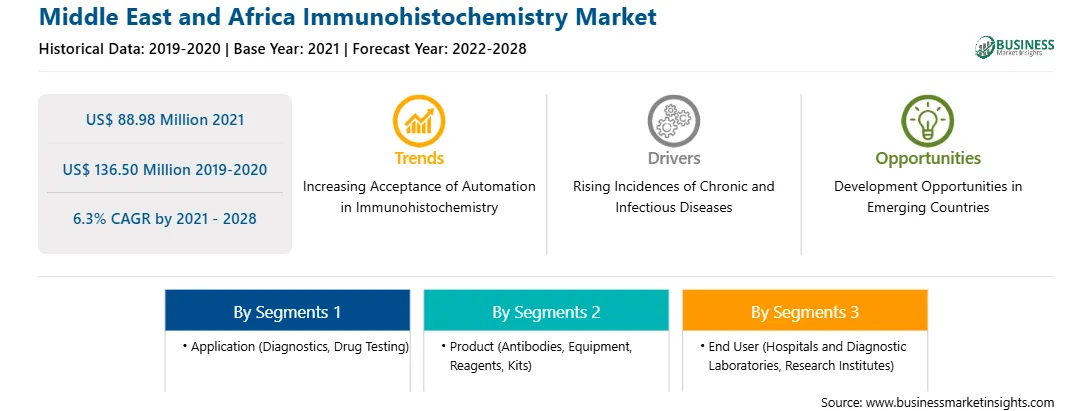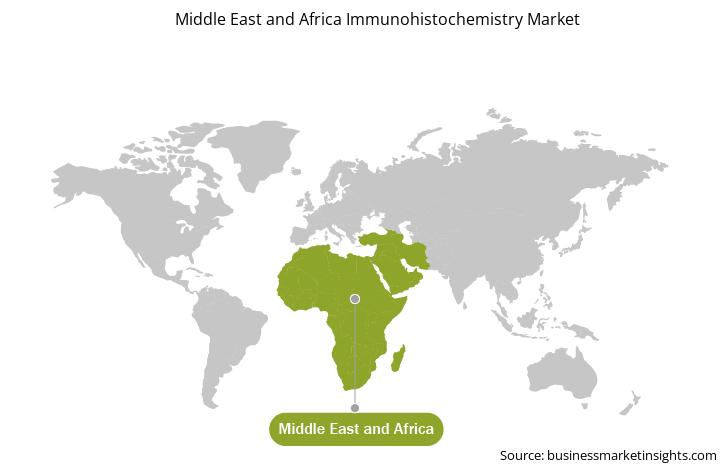The United Arab Emirates (UAE), Saudi Arabia and South Africa are the 3 major countries in the MEA. The Saudi Arabia was the largest market for immunohistochemistry in this region in 2021. Saudi Arabia is one of the fastest-growing countries in the Middle East and Africa, with a large population suffering from cancer fueling its growth. Additionally, Saudi Arabia (KSA) has Saudi Vision 2030 that prioritizes the prevention and promotion of new non-communicable diseases (NCDs) model of care. Moreover, the estimated cancer incidence and prevalence will increase twice by 2030 in the KSA. According to WHO 2018, ~24,485 new cancer cases were registered in the country. Among them, breast cancer cases were around 3,629; colorectum cancer cases were 3,564. The presence of laboratories that provide diagnostic procedures is also expected to fuel market growth. Al Borg Medical Laboratories, based in Saudi Arabia, for example, provides a wide range of routine, specialised, and sub-specialty laboratory tests. It offers excellent and cutting-edge laboratory medicine services throughout the Middle East. The Saudi Food and Drug Authority Strategic Plan (2018–2022) was recently proposed by the government as its third annual strategic plan. The project incorporates the vision and strategic priorities developed by the drug, food, and medical device regulators. They also intend to establish a central testing lab in Riyadh for research purposes. Furthermore, the Government plans to spend almost US$13.3 billion (50 billion riyals) by 2020 on an initiative to promote entertainment, health, sport, and education. Therefore, the increase in better facilities for health and education are likely to create good opportunities for the immunohistochemistry market.
In case of COVID-19, MEA is highly affected especially South Africa. Economic uncertainties and ongoing conflicts are worsening the condition in the region. For instance, countries such as Syria, Libya, and Yemen are suffering violent conflicts and cannot implement robust public health measures. Iran was in deep economic recession due to the US sanctions. Also, the major source of economic stabilization in Middle East countries is oil production and export. However, the recent pandemic is causing turbulence to the economies of the Middle East. A sudden drop in domestic and external demand for goods and products, especially crude oil, and halted production due to labor shortage, are major impacts observed in the region. The spread of coronavirus in the region caused heavy burdens on healthcare professionals. Cardiac surgeons were overloaded with emergency cardiac surgeries, management of coronavirus patients, and implementation of safety guidelines to prevent the spread of virus. Rapid spread to virus impacted to elective surgeries. These factors are projected to hamper the growth of MEA immunohistochemistry market.

Strategic insights for the Middle East and Africa Immunohistochemistry provides data-driven analysis of the industry landscape, including current trends, key players, and regional nuances. These insights offer actionable recommendations, enabling readers to differentiate themselves from competitors by identifying untapped segments or developing unique value propositions. Leveraging data analytics, these insights help industry players anticipate the market shifts, whether investors, manufacturers, or other stakeholders. A future-oriented perspective is essential, helping stakeholders anticipate market shifts and position themselves for long-term success in this dynamic region. Ultimately, effective strategic insights empower readers to make informed decisions that drive profitability and achieve their business objectives within the market.

| Report Attribute | Details |
|---|---|
| Market size in 2021 | US$ 88.98 Million |
| Market Size by 2028 | US$ 136.50 Million |
| Global CAGR (2021 - 2028) | 6.3% |
| Historical Data | 2019-2020 |
| Forecast period | 2022-2028 |
| Segments Covered |
By Application
|
| Regions and Countries Covered | Middle East and Africa
|
| Market leaders and key company profiles |
The geographic scope of the Middle East and Africa Immunohistochemistry refers to the specific areas in which a business operates and competes. Understanding local distinctions, such as diverse consumer preferences (e.g., demand for specific plug types or battery backup durations), varying economic conditions, and regulatory environments, is crucial for tailoring strategies to specific markets. Businesses can expand their reach by identifying underserved areas or adapting their offerings to meet local demands. A clear market focus allows for more effective resource allocation, targeted marketing campaigns, and better positioning against local competitors, ultimately driving growth in those targeted areas.

The MEA immunohistochemistry market is expected to grow from US$ 88.98 million in 2021 to US$ 136.50 million by 2028; it is estimated to grow at a CAGR of 6.3% from 2021 to 2028. In recent years, the biotechnology industry is developing at an extraordinarily rapid speed. Manufacturers are confronting to the various healthcare difficulties through the latest medicines, progressing digitalization, therapy forms, and continuously changing the management. As per the statistics from the World Health Organization (WHO), the population is rising by 1.2% per annum, leading to growth in population in the elderly class. The WHO also reveals that the balance of people aged 65 to 80 will increase to 28% in 2030, as compared to 22% in 2000. Additionally, rising urbanization and a growing number of middle-income people results in drug makers manufacturing reasonable medicines is responsible to drive the growth of the market. These formulations are produced in the market after passing through strict regulatory guidelines for patient safety. Research & development expenses compared to the methods of exploring, examining, and producing innovative products, upfront payments, and milestones, enhancing products, and exhibiting product efficiency and regulatory compliance before launch. Thus, the high research investment by investors, biopharmaceutical, and biotechnology industries are expected to propel the growth of the immunohistochemistry market over the forecast years. The increasing investments in R&D activities have paved the way for the growth of the industry in the future years. Many scientists, in partnership with other scientists, offer various products for bioreactors. These factors are expected to increase biotechnology and biopharmaceutical industries to achieve efficient tests which are predicted to drive the growth of the MEA market.
In terms of product, the antibodies segment accounted for the largest share of the MEA immunohistochemistry market in 2020. In terms of application, the diagnostics segment held a larger market share of the MEA immunohistochemistry market in 2020. Further, the hospitals and diagnostic laboratories segment held a larger share of the MEA immunohistochemistry market based on end user in 2020.
A few major primary and secondary sources referred to for preparing this report on the MEA immunohistochemistry market are company websites, annual reports, financial reports, national government documents, and statistical database, among others. Major companies listed in the report are Abcam plc; Agilent Technologies, Inc.; Bio SB; BIO-RAD LABORATORIES INC.; Danaher; F. HOFFMANN-LA ROCHE LTD.; MERCK KGaA; PerkinElmer Inc.; and THERMO FISHER SCIENTIFIC INC.
The Middle East and Africa Immunohistochemistry Market is valued at US$ 88.98 Million in 2021, it is projected to reach US$ 136.50 Million by 2028.
As per our report Middle East and Africa Immunohistochemistry Market, the market size is valued at US$ 88.98 Million in 2021, projecting it to reach US$ 136.50 Million by 2028. This translates to a CAGR of approximately 6.3% during the forecast period.
The Middle East and Africa Immunohistochemistry Market report typically cover these key segments-
The historic period, base year, and forecast period can vary slightly depending on the specific market research report. However, for the Middle East and Africa Immunohistochemistry Market report:
The Middle East and Africa Immunohistochemistry Market is populated by several key players, each contributing to its growth and innovation. Some of the major players include:
The Middle East and Africa Immunohistochemistry Market report is valuable for diverse stakeholders, including:
Essentially, anyone involved in or considering involvement in the Middle East and Africa Immunohistochemistry Market value chain can benefit from the information contained in a comprehensive market report.